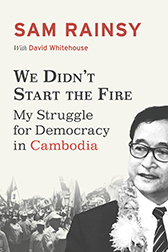There is an impertinent question I have always wanted to ask Sam Rainsy,  leader of Cambodia’s opposition Cambodia National Rescue Party (CNRP) contesting this weekend’s elections. Why exactly did you name your previous political party after yourself? The answer to the question comes on page 98 of his new memoir, a personally revealing and persuasive book that bears the somewhat silly title of We Didn’t Start the Fire: My Struggle for Democracy in Cambodia.
leader of Cambodia’s opposition Cambodia National Rescue Party (CNRP) contesting this weekend’s elections. Why exactly did you name your previous political party after yourself? The answer to the question comes on page 98 of his new memoir, a personally revealing and persuasive book that bears the somewhat silly title of We Didn’t Start the Fire: My Struggle for Democracy in Cambodia.
It was March 1998, a volatile time in Phnom Penh, especially for activists and opposition members mindful of the previous year’s bloody coup and political violence. In 1997, Rainsy, then head of the Khmer Nation Party – which was founded in 1995 after he broke with the ineffectual royalists of Funcinpec – had survived a grenade attack that killed almost 20 people.
The opposition accused prime minister Hun Sen’s security forces of the attack. But the following year Rainsy found himself the target of an altogether different type of assault: copyright infringement. In Rainsy’s telling, the ruling Cambodian People’s Party (CPP) had created a breakaway faction to counter-claim the “Khmer Nation Party” name. With the 1998 national elections looming, the courts would not make a decision on who rightfully owned the name before the polls, and Rainsy believes the delay was meant to sow confusion among voters who wanted to support him.
“This left us with no choice. Sam Rainsy was the only name that couldn’t be stolen,” he writes, quick to add the answer that pops up in any reader’s mind. “The fact that the party was named after me was not intended to imply a cult of personality.”
He had no choice. Much of Rainsy’s life, as told in this memoir, has this inexorable quality to it. He stepped up when no one else would step up. He filled the role of reformer when others in public life cowered in fear.
In recounting his youth, at least, this narrative has a ring of truth to it. His political education started early. Shortly after Cambodia’s independence in 1953, then-King Norodom Sihanouk abdicated the throne in favor of his father to establish the political movement Sangkum Reasr Niyum. In the 1950s, Rainsy’s father, Sam Sary (in Cambodia, family names come first and given names last), went from a judgeship to holding several ministerial positions. Eventually, he moved into Sihanouk’s inner circle.
However, the relationship didn’t last long. Sihanouk and Sary, to put it mildly, didn’t see eye to eye. Sihanouk brooked little dissent in his regime, and he “routinely used murder and repression against his opponents”, Rainsy writes. In a 1955 referendum, voters were asked, according to Rainsy’s recounting, to pick between a white ballot and a black one. White if they loved Sihanouk; black, well, you get the point.
He took home a laughable 925,667 votes, while a mere 1,834 opposed. “Readers are asked to judge for themselves how much has changed in the intervening decades,” Rainsy writes. A continuing theme of the book is that each successive regime has built on the repressive policies of its predecessor. In one form or another, he argues, the tactics have never changed.
Impressionable youth
Sary didn’t believe in the strongman style. In 1956, he brought home photos to show Rainsy, then seven years old, of Hungarian dissidents killed in a crackdown by Russian security forces. The photos made a lasting impression on him, he writes.
The fallout with Sihanouk started when Sary, who had moved his family to London to serve as ambassador, made the local papers in an embarrassing scandal. His “mistress,” who also lived with the family, had been beaten up and taken to hospital. Rainsy says his mother actually caused the injuries but his father accepted responsibility.











